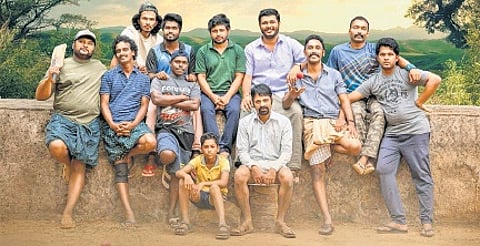

In the quiet lanes of a village under lockdown, the Zakariya-starrer Communist Pacha Adhava Appa walks onto the field, promising a heartfelt story. It looks like it wants to be as warm as Rakshadhikari Baiju Oppu or 1983, or even Zakariya’s directorial debut Sudani From Nigeria.
Shamim Moideen’s film ambitiously sets out to explore themes of community, caste, religion and identity against the backdrop of the first Covid-19 lockdown in India. Alas, what unfolds is less a sixer and more a sequence of dot balls, testing the patience for most part of its running time.
The story follows Wahid, played by Zakariya, originally working in Bengaluru, now back in his village during the lockdown. Soon, backyard cricket becomes the community’s collective escape—a stage where egos clash, prejudices simmer, and the rules of the game are as fickle as the plot itself. At first, these matches seem like a simple escape.
But as the days go by, old rivalries and buried tensions come to light, including Wahid’s troubled history with Babeesh (Shamsu Mankarathodi), a former schoolmate. It’s a setup that could’ve been a charming dramedy on life, love, and politics. Instead, the first half feels like a drawn-out warm-up session where nothing quite happens. Instead of pulling us into the community, the film keeps wandering, unsure of what it wants to say.
Halfway through, the film stirs, as if jolted awake by a much-needed drinks break. Themes of casteism, class divides and Islamophobia begin to surface now and then. A Dalit character’s silent endurance of indignities, the casual venom of an old Hindu lady’s entitlement, and Wahid’s conflicted response to eased lockdown restrictions during Eid—each thread hints at depth but rarely weaves into a cohesive narrative.
Ashif Kakkodi’s writing jumps between ideas, never driving any of them home with conviction. Wahid’s growth as a character also leaves a lot to be desired, as does Zakariya’s stiff acting with consistently stoic expressions. By the time Wahid learns his lesson, we are past caring.
Even the cricket, the supposed heart of the film, feels lifeless. Matches escalate into ego-driven spats, but the tension never quite translates into riveting drama. Even at just two hours, the film drags. Its attempt to cover so many issues makes it feel messy and unfocused.
Unlike last year’s Tamil gem, Lubber Pandhu, which tackled similar touchy topics with finesse and heart, Communist Pacha Adhava Appa seems content to meander, its ideas never landing a decisive blow. Oddly enough, the only moments that truly shine are the ones off the field. Khadeeja (played ably by Nazlin Jameela Saleem), Wahid’s wife, is the real all-rounder here, like a lighter version of Swasika’s character from Lubber Pandhu.
She keeps the family together with her unflinching dedication, delivers much-needed pep talks to Wahid and scores the film’s rare emotional runs. Her scenes are a relief in an otherwise stale innings, making you wish the film had spent more time in her company. While Sarassa Balusseri is charming as Wahid’s mother, her performance heavily resembles her breakout act from Sudani From Nigeria.
Somewhere amid its missteps lies a poignant story waiting to be told—a tale of prejudice, fear, and resilience in a time of crisis. Unfortunately, Communist Pacha Adhava Appa fumbles heavily with its execution.
Film: Communist Pacha Adhava Appa
Director: Shamim Moideen
Cast: Zakariya, Nazlin Jameela Saleem, Althaf Salim, Vijilesh, Sarasa Balisseri, Kudassanad Kanakam, Shamsu Mankarathodi
Rating : 1.5/5